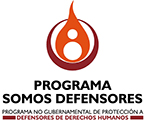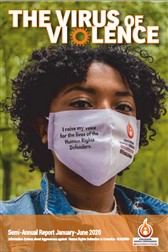In Colombia, the first semester of 2020 unfolded amidst confusion and uncertainty due to various situations: the virus of violence, the COVID-19 pandemic, and the stalking of democratic institutions that was clearest and most evident during this period and the following months.
These three situations converge in a common element that is the vulnerability under which social leaders carry out their work, which could be observed during such a semester, due to an increase in the risks they face. The measures of social isolation imposed to face the pandemic and that ruled in a strict way during half of the semester, did not prevent the execution of violent actions that attempted against the life of the social leaderships. During this period, the murders against them increased by an alarming 61% compared to the same period of the previous year, of which 48% of the total occurred during the confinement stage. Attacks and forced disappearances also registered a significant increase, as well as aggressions against freedom, such as arbitrary detentions and judicializations.
Within this context, the uneasiness generated by observing how the situation of violence against social leaders continues to worsen along with the increase in human rights violations such as massacres, displacements, profiling, and police violence; all of which make it inevitable to turn our attention to a very dark recent past that is being repeated, not because the government led by President Iván Duque lacks a defined direction but, on the contrary, because its direction is framed by the political-ideological ideology of his mentor.
The semi-annual report that we have entitled The Virus of Violence aims to provide elements of analysis on attacks against human rights defenders, starting from the confluence during the period of the three aforementioned situations.
The report begins with a small review in memory of the 95 people killed during the first half of 2020, which seeks to recognize the struggles of these social leaders. This brief description allows us to give an account of some elements that are worth highlighting: several of the cases occurred in or near their place of residence, in some of them there was a displacement of population after the murder, several situations are recorded, which relate the victim to processes of voluntary substitution of crops considered to be for illicit use, and three cases can be classified as feminicide.
The first chapter entitled Covering One’s Mouth, places the consideration of the context in different aspects related to the increase of militarization in the territories, including the presence of U.S. troops and the implications of the measures adopted to deal with the COVID-19 pandemic for freedoms and democratic institutions.
The second chapter, called “Washing Hands Thoroughly”, refers to the major pending issues that the National Government has with social leaderships and communities, with a view to providing the appropriate guarantees for the exercise of human rights. This chapter offers an overview of what has been said and done by the government during the past six months on this subject, with special emphasis on some of the actions that threaten the memory of the victims; the entrapment of the National Commission for Security Guarantees (CNGS), the CONPES in its labyrinth, the obsolescence of the individual protection model at the head of the National Protection Unit (UNP), and the poor results of the investigative and control bodies such as the Attorney General’s Office and the Procurator General’s Office..
The third chapter seeks to recognize the entire repertory of actions carried out both by actors in the international community and civil society, aimed at giving visibility to the seriousness of the situation, recognizing the importance of leadership, and demanding compliance with the obligations that fall upon the State in general and the Government in particular, with a view to providing guarantees for the exercise of the work of defending human rights. That is the reason for the title of this chapter: Raising Our voice to Regain Oxygen.
The fourth chapter reports on the analysis of information carried out by the Program’s Information System on Aggressions against Human Rights Defenders -SIADDHH-; data that shows the seriousness of the situation of violence, the increasing impossibility to identify the alleged perpetrators, the trends that remain in terms of aggressions by type of leadership and territorial location and towards social leaders. It is important to highlight the effort made by the Information System to confirm the data included in the report, due to the obstacles derived from the isolation measures, which makes it necessary to warn that the figures of the aggressions during the analyzed period present a higher than usual under-recording, which must be recognized and taken into account.
Finally, the report draws attention over some points considered quite important to keep in mind as conclusions.
It is not possible to close this presentation without expressing the profound gratitude that the entire team of the Somos Defensores Program feels for all the people and organizations that have believed in our work and contributed with their share to this six-monthly report, especially the Center for Research and Popular Education (CINEP), the Colombia-Europe-United States Coordination (CEC), and the Ombudsman’s Office, the Office of the United Nations High Commissioner for Human Rights in Colombia (OHCHR), the South Colombian Observatory for Human Rights and Violence (OBSURDH), Colombia Diversa, the Association of Indigenous Councils of Northern Cauca (ACIN), the Regional Indigenous Council of Cauca (CRIC), the Territories for a Dignified Life Foundation, the Sumapaz Foundation, the Cordobexia Foundation, and the Civic Committee for Human Rights in Meta. In addition, we acknowledge the Royal Norwegian Embassy in Colombia for its constant political and financial support, and the international cooperation agencies DIAKONIA Sweden, MISEREOR Germany, Amnesty International and Bread for the World; their support is fundamental to advancing our work with human rights defenders in Colombia.

